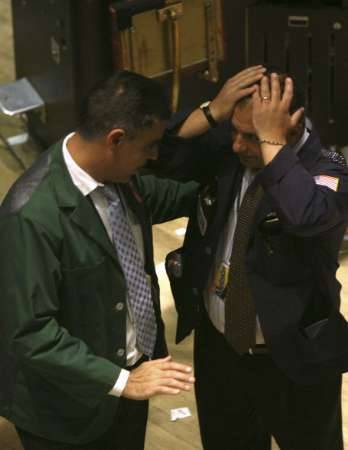Another banking crisis?
 Duderonomy
Haut de la Garenne 7,784 Posts
Duderonomy
Haut de la Garenne 7,784 Posts
http://www.bbc.co.uk/news/business-14416959
b/w
My new favourite blog: Brokers with hands on their faces.
1929

2011

It is nearly four years since the day, 9 August 2007, which for many of us marks the start of the credit crunch - that in turn precipitated both the worst global banking crisis and recession for at least 70 years.
Today's financial crisis can be traced directly to those momentous events. The response of governments around the world to the financial crisis and recession was to keep or even increase public spending, at a time of falling tax revenues, to compensate for the collapse of household consumption and private-sector investment.
In other words, they ran abnormally high public sector deficits - peaking at deficits in the UK, US and parts of the eurozone at 10% or more of GDP - to prevent a global recession becoming a global depression.
In that sense, it is fair to argue that the recent increases in the public-sector indebtedness of many developed economies is the consequence in large part of the decisions taken in 2007 and 2008 not to let the banks and the financial system collapse.
Arguably the deleveraging of the banks, the shrinkage in their balance sheets, has been transferred to the state. The overall volume of indebtedness in the economy is therefore still with us - although it has been shuffled from financial sector to public sector.
And if you took the view four years ago that the quantum of debt in the system was unsustainably large, then you would argue that by propping up the banks, the day of reckoning was being postponed, not cancelled.
b/w
My new favourite blog: Brokers with hands on their faces.
1929

2011


Comments
Wait... Didn't you read Larry's posts? There was no bank bailout, just normal businessasusual overnight loans.
I need one of those phones.
:shitty:
"On the other hand, it???s hard to think of anyone less qualified to pass judgment on America than the rating agencies. The people who rated subprime-backed securities are now declaring that they are the judges of fiscal policy? Really?"